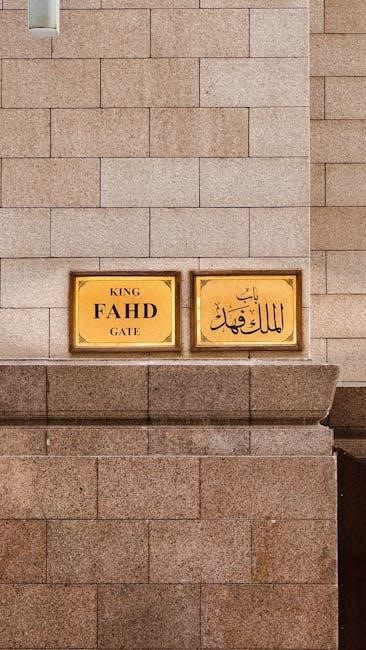The study of kings and prophets provides a rich historical and spiritual framework, tracing the timeline of Israel’s monarchy and the divine messages conveyed through prophetic voices․ This period, spanning from Saul to the fall of Judah, highlights the interplay between royal authority and divine guidance, offering insights into faith, leadership, and redemption․ The timeline serves as a foundational tool for understanding the chronological events and the roles of key figures in shaping Israel’s destiny․
1․1 Importance of the Timeline
The timeline of kings and prophets is essential for understanding the chronological flow of Israel’s history, from the United Kingdom to the Divided Kingdom․ It provides a structured framework to analyze the reigns of kings, their actions, and the prophetic messages delivered during their rule․ By organizing events sequentially, the timeline reveals patterns of obedience and rebellion, highlighting the consequences of leaders’ choices․ It also illustrates the prophetic ministries, showing how figures like Elijah, Elisha, and Isaiah influenced royal decisions and national direction․ Additionally, the timeline clarifies the historical context of prophetic writings, linking them to specific kings and events․ This chronological approach aids in studying cause and effect, such as how certain kings’ policies led to prosperity or decline․ Furthermore, it helps trace the progression of God’s plan, as prophets often foreshadowed future events, including the coming Messiah․ Thus, the timeline is a vital tool for comprehending the interplay between leadership and divine purpose in Israel’s history․
1․2 Sources for the Timeline
The timeline of kings and prophets is primarily derived from the Hebrew Bible, particularly the books of 1 Samuel, 2 Samuel, 1 Kings, 2 Kings, and 2 Chronicles․ These texts provide detailed accounts of royal reigns, key events, and prophetic activities․ Archaeological findings, such as the Taylor Prism and the Shalmaneser Obelisk, corroborate biblical records, offering external validation․ Additionally, historical documents like the Moabite Stone and the Tiglath-Pileser III annals provide context about the broader ancient Near Eastern world․ Modern scholars also rely on scholarly works, such as the Rose Book of Bible Charts and the NIV Archaeological Study Bible, which synthesize biblical and extrabiblical data․ Online resources, including PDF charts and timelines from reputable sources, further aid in visualizing and understanding the sequence of events․ These diverse sources collectively enhance the accuracy and depth of the timeline, making it a comprehensive tool for studying Israel’s monarchy and prophetic history․

The United Kingdom Period
The United Kingdom Period, spanning approximately 1050–931 BC, saw the rise of Saul, David, and Solomon as rulers of a unified Israel․ This era marked the establishment of the monarchy, territorial expansion, and the zenith of Israel’s political and cultural power under Solomon’s wisdom․ The transition from tribal leadership to a centralized monarchy laid the foundation for future divisions and prophetic interventions, shaping Israel’s identity and destiny․
2․1 Kings of the United Kingdom: Saul, David, and Solomon
The United Kingdom of Israel was ruled by three prominent kings: Saul, David, and Solomon․ Saul, the first king, was anointed by Samuel but faced challenges in leadership, ultimately leading to his downfall․ David, renowned for his victory over Goliath, succeeded Saul and established Jerusalem as the capital, uniting the tribes and expanding Israel’s borders․ His reign is often viewed as a golden age of Israelite history․ Solomon, David’s successor, inherited a prosperous kingdom and built the First Temple in Jerusalem, showcasing wisdom and wealth․ However, his later life was marred by idolatry due to his many foreign wives, setting the stage for future division․ These three kings laid the foundation for Israel’s monarchy, with their reigns marking significant political, religious, and cultural developments․ Their stories, as recorded in the Bible, provide insights into leadership, faith, and the complexities of human rule under divine guidance․
2․2 Prophets During the United Kingdom
During the United Kingdom period under Saul, David, and Solomon, prophets played a pivotal role in shaping Israel’s spiritual and political landscape․ Samuel, the last judge of Israel, transitioned into the role of a prophet and anointed both Saul and David as kings․ His prophetic ministry emphasized obedience to God and set the tone for future prophetic voices․ Nathan, another prominent prophet, confronted David over his sin with Bathsheba and delivered the prophecy of the Davidic covenant, ensuring a lasting dynasty․ Gad and Nathan also served as royal advisors, blending prophetic insight with practical governance․ These prophets acted as intermediaries between God and the monarchy, providing guidance, correction, and divine perspective․ Their ministries underscored the importance of faith and obedience, even amidst the challenges of transitioning from tribal rule to a centralized monarchy․ The prophets during this era laid the groundwork for the prophetic tradition that would continue to influence Israel’s history, emphasizing God’s sovereignty and covenant faithfulness․

The Divided Kingdom
Following Solomon’s reign, Israel split into two kingdoms: Israel (north) and Judah (south)․ This division led to distinct political and religious paths, with prophets playing key roles in guiding both nations through turmoil and transformation․

3․1 Division into Israel and Judah
The division of the kingdom occurred after King Solomon’s death, around 931 BC, due to discontent over his policies and heavy taxation․ His son, Rehoboam, succeeded him but faced rebellion led by Jeroboam I, who had been exiled in Egypt․ The kingdom split into two: the northern kingdom, Israel, ruled by Jeroboam I, and the southern kingdom, Judah, ruled by Rehoboam․ Israel comprised ten tribes, while Judah included the tribes of Judah and Benjamin, along with the priestly tribe of Levi․ This division marked the beginning of distinct political and religious paths for both kingdoms․ The northern kingdom established its capital in Samaria, while Judah retained Jerusalem as its capital․ Prophets played a significant role in both kingdoms, often calling their rulers and people back to faithfulness․ This division set the stage for the complex interplay of kingship and prophecy that would shape Israel’s history․
3․2 Key Events in the Divided Kingdom
During the divided kingdom period, both Israel and Judah experienced significant events that shaped their histories․ In Israel, key events included the establishment of Jeroboam I’s golden calf worship at Bethel and Dan, which became a recurring sin․ The prophet Elijah confronted King Ahab over issues of idolatry, notably during the Mount Carmel showdown with the prophets of Baal․ Elisha, Elijah’s successor, performed numerous miracles and played a crucial role in Israel’s political and spiritual life․ In Judah, King Asa implemented reforms, removing idolatrous practices, while King Jehoshaphat strengthened Judah’s alliances and judicial systems․ The prophet Micaiah warned against alliances with Israel’s King Ahab, emphasizing trust in God alone․ These events highlight the ongoing struggle between faithfulness and idolatry, as well as the prophetic calls to repentance that defined this era․ The divided kingdom period ultimately led to the fall of Israel to Assyria in 722 BC and Judah’s eventual fall to Babylon in 586 BC, marking the end of the monarchy and the beginning of the exile․

Major Kings of Israel
The major kings of Israel include Jeroboam I, who led the split, and Omri, who established Samaria as the capital․ Ahab, known for his conflicts with Elijah, faced prophetic condemnation․ Jehu’s violent takeover and reforms marked a significant turning point, impacting Israel’s political and religious landscape․
4․1 Jeroboam I and the Split
Jeroboam I, a pivotal figure in Israel’s history, emerged as the first king of the northern kingdom after the division of the monarchy following Solomon’s death․ His reign, marked by significant political and religious changes, laid the groundwork for the divergence between Israel and Judah․ Jeroboam, an Ephraimite, had previously served as a leader under Solomon but rebelled after being anointed by the prophet Ahijah, who foretold his kingship over the ten northern tribes․
Jeroboam’s reign (c․ 931–910 BCE) was defined by his efforts to establish Israel’s independence from Judah․ He introduced religious reforms, including the creation of golden calves at Bethel and Dan, to prevent his people from worshiping in Jerusalem․ These actions, though politically strategic, were deemed idolatrous by prophets like Ahijah, who condemned his policies․ Jeroboam’s military conflicts with Judah and his alliance with Egypt further solidified the division․ Despite his efforts to unify Israel, his legacy was marred by the prophetic warnings of impending judgment, setting the stage for future turmoil in the kingdom․
4․2 Omri and Ahab
Omri, one of Israel’s most impactful kings, ruled from 876 to 869 BCE and established Samaria as the capital, strengthening Israel’s political and military infrastructure․ His reign marked a period of relative stability, but his policies were criticized by prophets for perpetuating idolatry․ Omri’s legacy endured long after his death, as his name became synonymous with Israel in Assyrian records․
Ahab, Omri’s successor, ruled from 869 to 850 BCE and is infamous for his marriage to Jezebel, a Phoenician princess, which led to the promotion of Baal worship in Israel․ The prophet Elijah confronted Ahab, condemning his idolatrous practices and predicting devastating consequences․ Ahab’s reign was marked by conflicts with the Arameans, particularly the Battle of Aphek, and his eventual death in battle․ Despite his military successes, Ahab’s spiritual failures left a lasting negative impact on Israel, as highlighted in the prophetic narratives of the time․
4․3 Jehu and Jehoahaz
Jehu, who ruled Israel from 850 to 839 BCE, came to power after a dramatic coup orchestrated by the prophet Elisha․ Jehu was anointed to destroy the house of Ahab and eradicate Baal worship, which he did ruthlessly․ Despite his obedience to God’s command, Jehu’s reign was marked by continued idolatry, as he allowed the worship of the golden calves at Dan and Bethel to persist․ His military campaigns against the Arameans were successful, but his spiritual compromises set a precedent for future kings․ Jehu’s dynasty lasted four generations, a period of relative stability compared to the frequent coups in earlier reigns․
Jehoahaz, Jehu’s son, ruled from 839 to 782 BCE and faced severe oppression from the Arameans․ The Bible records that he prayed to God for relief, and his situation improved, though he did not fully abandon idolatry․ His reign reflects the ongoing struggle between divine faith and the persistent influence of pagan practices in Israel․

Major Kings of Judah
The kings of Judah, including Rehoboam, Abijah, Asa, Jehoshaphat, Uzziah, and Jotham, ruled with varying degrees of faithfulness․ Their reigns were marked by periods of reform, prosperity, and conflict, influenced by prophetic guidance and national crises․
5․1 Rehoboam and Abijah
Rehoboam, the first king of Judah after the kingdom’s division, faced immediate challenges, including an attack by Pharaoh Shishak, who seized treasures from the Temple․ His reign was marked by idolatry and internal strife, as documented in 1 Kings 14:21-31 and 2 Chronicles 12:1-16․ Despite his failures, Rehoboam managed to strengthen Judah’s defenses and maintain control over key cities․
Abijah, Rehoboam’s successor, sought to reunify the kingdom and claimed the priesthood as Judah’s exclusive right․ He defeated Jeroboam I of Israel in battle, capturing key territories․ Abijah’s reign, though brief, demonstrated a commitment to Yahweh, as highlighted in 2 Chronicles 13:1-22․ The prophet Azariah played a significant role during this period, urging Asa, Abijah’s successor, to remain faithful and reform Judah’s practices․
Both Rehoboam and Abijah’s reigns set the stage for the rise of subsequent kings, such as Asa, who would implement major religious reforms under prophetic guidance․ Their stories illustrate the ongoing struggle between faithfulness and compromise in Judah’s early monarchy․
5․2 Asa and Jehoshaphat
Asa, who ruled Judah from 908 to 867 BC, is noted for his extensive reforms and commitment to purging idolatry․ According to 2 Chronicles 14:2-5, he removed idols, tore down high places, and restored the altar of the Lord․ The prophet Azariah son of Oded played a pivotal role during his reign, urging Asa to remain faithful to God․ Asa’s reforms led to a period of peace, but his reliance on the King of Aram in a conflict with Baasha of Israel drew criticism from the prophet Hanani, as recorded in 2 Chronicles 16:7-10․

Jehoshaphat, succeeding Asa, ruled from 867 to 846 BC and continued his father’s legacy of faithfulness․ He sent Levites to teach the Law in Judah and established a fair judicial system․ However, his alliance with Ahab of Israel, which led to the Battle of Ramoth Gilead, was strongly condemned by the prophet Jehu․ Despite this, Jehoshaphat remained a righteous king, and his reign saw significant prophetic activity, including the ministry of Jahaziel, who predicted victory over the Moabites and Ammonites (2 Chronicles 20:1-30)․
5․3 Uzziah and Jotham
Uzziah, who ruled Judah from 791 to 740 BC, is remembered as a king who “did right in the eyes of the Lord” (2 Chronicles 26:4)․ His reign was marked by military and economic prosperity, rebuilding Jerusalem’s walls, and restoring the temple․ The prophet Isaiah began his ministry during Uzziah’s reign, emphasizing the king’s initial faithfulness but also highlighting the spiritual complacency that emerged later in his rule․ Uzziah’s life ended tragically when he attempted to burn incense in the temple, a duty reserved for priests, leading to his death at the hands of God (2 Chronicles 26:16-23)․
Jotham, Uzziah’s son, ruled from 750 to 735 BC and followed in his father’s footsteps, adhering to Judah’s traditional policies․ While his reign was less eventful, Jotham maintained the spiritual reforms initiated by Uzziah and avoided the pitfalls of his father’s later years․ His rule is noted for its stability and continuity, reflecting the enduring legacy of Judah’s kings who remained faithful to God during this period․

Notable Prophets of Israel
The prophets of Israel played a pivotal role in guiding the nation spiritually and morally, often serving as intermediaries between God and His people․ Their ministries were deeply intertwined with the reigns of various kings, as they delivered messages of judgment, repentance, and hope․ Elijah and Elisha were prominent figures during the divided kingdom, confronting idolatry and performing miraculous works․ Amos and Hosea prophetically addressed Israel’s moral decay, while Jonah’s mission to Nineveh showcased God’s mercy․ Micah and Isaiah, active in Judah, emphasized justice and the coming Messiah․ These prophets not only reflected the spiritual state of their times but also shaped the theological landscape of Israel, leaving a lasting legacy in the Old Testament․